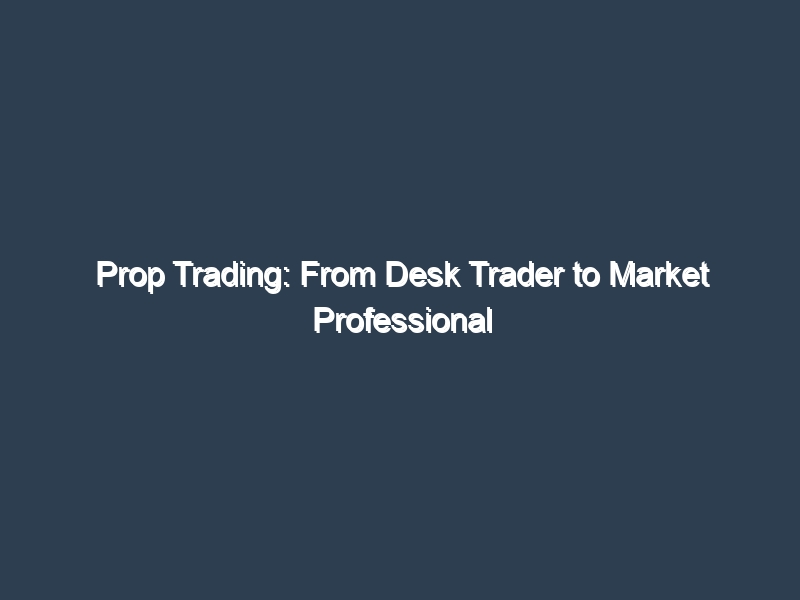
6 Dec
Prop Trading: From Desk Trader to Market Professional
Proprietary trading, commonly referred to as prop trading, plays a crucial role in the financial markets as firms use their own capital to trade various assets.
This discussion delves into the evolution of prop trading, emphasizing its transition from traditional desk trading to contemporary strategies. It outlines the essential skills and qualifications required to excel in this dynamic field, as well as the challenges and rewards associated with it.
Moreover, it offers actionable steps for aspiring traders and insights into the future trends that are shaping the industry. Explore the intricate world of prop trading and discover what it takes to succeed in this exciting profession.
Understanding Prop Trading
Understanding proprietary trading is essential for anyone interested in the dynamic world of financial markets. Proprietary trading firms utilize their own capital to engage in a variety of trading strategies across asset classes such as equities, forex, and commodities.
As a market professional, you should be equipped to navigate the complexities of trading psychology and risk management to enhance your trading performance. This unique approach enables desk traders to capitalize on market opportunities and trends while conducting comprehensive investment analysis to optimize their trades.
Definition and Role in the Financial Market
The definition of proprietary trading involves firms that engage in trading financial instruments using their own capital. Their primary goal is to generate profits through various trading systems and strategies while navigating the complexities of financial markets.
These firms operate as market makers, employing sophisticated algorithms and comprehensive analysis to execute orders with precision. They closely monitor market trends, enabling them to swiftly adjust to changing conditions and capitalize on liquidity fluctuations.
By leveraging their own resources and trading techniques, proprietary trading firms play a crucial role in enhancing the overall efficiency of financial markets. They provide increased liquidity and tighter spreads, which not only contributes to market stability but also ensures that investors can buy and sell assets without causing significant price impacts, thereby improving the overall trading environment.
The Evolution of Prop Trading
The evolution of proprietary trading has shifted from traditional desk trading, where traders depended on market intuition and technical analysis, to contemporary strategies that integrate algorithmic trading and quantitative analysis.
This transition has revolutionized the ways in which trading performance is measured and achieved in today’s financial markets.
From Traditional Desk Trading to Modern Strategies
The transition from traditional desk trading to modern strategies has been significantly influenced by the emergence of algorithmic trading. This development enables you to utilize sophisticated trading algorithms and tools, optimizing your trading strategies and allowing for a more efficient response to market participants.
This shift has transformed the trading landscape, moving away from reliance on manual methods, such as chart analysis and instinct-driven decisions, which often led to slower reactions to market fluctuations.
In contrast, modern trading practices harness advanced technology, facilitating real-time analysis and execution of trades at unprecedented speeds. Algorithmic trading enhances your decision-making capabilities while minimizing human error, ultimately increasing overall trading accuracy.
Consequently, integrating these tools and strategies is essential for achieving successful outcomes in today’s fast-paced financial markets, enableing you to maintain a competitive edge.
Key Skills and Qualifications for Prop Traders
The key skills and qualifications for prop traders include a range of competencies, such as technical analysis, an understanding of trading psychology, and a strong foundation in trader education.
These elements are essential for achieving success in the fast-paced financial markets, where quantitative analysis and financial literacy are critical in guiding decision-making.
Technical and Soft Skills Required
Prop traders require a combination of technical skills and soft skills to succeed in the competitive trading landscape. Essential attributes include trading discipline, effective risk management, and a resilient mindset that enables you to navigate market volatility and make informed decisions.
To excel in this dynamic field, you must cultivate analytical skills to interpret market data and identify trends, along with a solid understanding of financial instruments and their correlations.
Soft skills, such as emotional intelligence, are equally important, as they allow you to remain composed under pressure and adjust your strategies in response to sudden market fluctuations.
Adopting the right trader mindset is crucial; it encourages a positive perspective on setbacks and fosters continuous learning and improvement.
By refining both your technical abilities and interpersonal skills, you can establish a comprehensive approach to risk management that significantly enhances your overall trading performance.
Challenges and Rewards of Prop Trading
The challenges and rewards of proprietary trading are closely intertwined. As a trader, you will encounter considerable trading risks and market volatility, while also having the potential to achieve substantial profits similar to those found in hedge funds.
This potential for earnings is contingent upon meeting your performance metrics and profit targets.
Risks and Benefits of the Profession
The risks and benefits of being a prop trader are significant, requiring you to navigate the trading risks associated with speculative trading and market inefficiencies while reaping the potential rewards of high returns and regular performance reviews to enhance your strategies.
Engaging in proprietary trading exposes you to market volatility, where sudden price fluctuations can result in substantial losses or gains. While the prospect of rapid profits is appealing, the unpredictable nature of this environment necessitates that you employ sound risk management practices.
Performance reviews act as crucial checkpoints, providing insights that refine your trading strategies. They help you identify strengths and weaknesses, enabling you to adapt to ever-changing market conditions.
By carefully weighing these risks against the potential rewards, you can make more informed decisions and navigate the challenging landscape of prop trading more effectively.
Steps to Becoming a Successful Prop Trader
To become a successful prop trader, you must follow a structured path that encompasses comprehensive trader education, effective networking, and the development of robust trading strategies.
Additionally, it is essential to build a track record that demonstrates consistent trading performance and skill in the financial markets.
Training, Networking, and Building a Track Record
Training, networking, and building a track record are fundamental elements for prop traders. Establishing a solid foundation in trader education, along with active participation in the trading community, can significantly enhance your trading performance and credibility in the industry.
Effective training equips you with the essential skills and knowledge needed to navigate the complexities of the market, allowing you to formulate strategies that can lead to successful trades. Networking provides opportunities to connect with mentors and peers who share valuable insights, experiences, and strategies, ultimately broadening your understanding of market dynamics.
A robust track record showcases your ability to adapt and produce consistent results over time, fostering trust among potential investors and collaborators. Engaging in the trading community not only aids in your skill development but also cultivates a support system that is essential for growth in this competitive landscape.
The Future of Prop Trading
The future of prop trading is expected to be influenced by evolving trading trends, including a growing reliance on algorithmic trading and advancements in trading infrastructure.
These developments will enhance the capabilities of market participants and redefine the landscape of financial markets.
Trends and Predictions for the Industry
Trends and predictions for the prop trading industry suggest that there will be a growing reliance on advanced trading software and tools. This evolution will necessitate that you continually enhance your skills and adapt your trading strategies to maintain a competitive edge in the rapidly changing financial landscape.
As algorithms become more sophisticated and machine learning techniques gain traction, it will be crucial for you to engage in comprehensive market analysis. These evolving tools not only enhance performance but also challenge you to develop a deeper understanding of market dynamics.
The ability to interpret data trends and implement effective risk management strategies will be essential for your success in this environment.
As the industry progresses toward increased automation, you will need to leverage your intuition and experience. This means that the combination of technical skills and analytical acumen will be more important than ever.
Frequently Asked Questions
What is prop trading?
Prop trading, short for proprietary trading, is a form of trading in which firms use their own capital to trade in financial markets, rather than using client funds. It involves taking positions in the market with the goal of making a profit for the firm.
What is the difference between a desk trader and a market professional?
A desk trader is a trader who works for a specific trading desk within a firm, while a market professional is an individual who is well-versed in the financial markets and has a deep understanding of trading strategies and techniques. A desk trader is typically focused on executing trades, while a market professional may also be involved in research and analysis.
What are the key skills required to transition from a desk trader to a market professional?
To transition from a desk trader to a market professional, one must possess strong analytical and problem-solving skills, as well as the ability to make quick decisions and manage risk effectively. Knowledge of financial markets and trading strategies is also essential.
How can one become a successful prop trader?
To become a successful prop trader, one must have a deep understanding of financial markets and trading strategies, as well as the ability to manage risk and make quick decisions. It is also important to continuously learn and adapt to changing market conditions.
What are the benefits of working as a prop trader?
Working as a prop trader can offer numerous benefits, including the potential for high earnings, flexibility in work schedule, and the opportunity to work in a fast-paced and dynamic environment. It also allows individuals to develop valuable skills and knowledge in the financial industry.
Are there any risks involved in prop trading?
Like any form of trading, prop trading involves risk. Traders must be able to manage risk effectively and be prepared for potential losses. However, with proper risk management and knowledge of the markets, the potential for high earnings can outweigh the risks.
Whether you’re a skilled trader ready to leverage institutional capital or a determined newcomer eager to prove your abilities, a prop trading career could be your entry into professional markets. Remember though – this isn’t a quick path to riches. It’s a serious business relationship that requires strategy, dedication, and impeccable risk control. Successful prop firms aren’t searching for lucky traders or one-hit wonders – they’re looking for disciplined professionals who can consistently generate returns. Take time to develop your skills, refine your approach, and find the right firm that matches your trading philosophy. The opportunity in prop trading is legitimate, but like every worthwhile pursuit in finance, it’s achieved through consistent execution and proven results.
Proudly powered byWordPress. Theme byInfigo Software.








